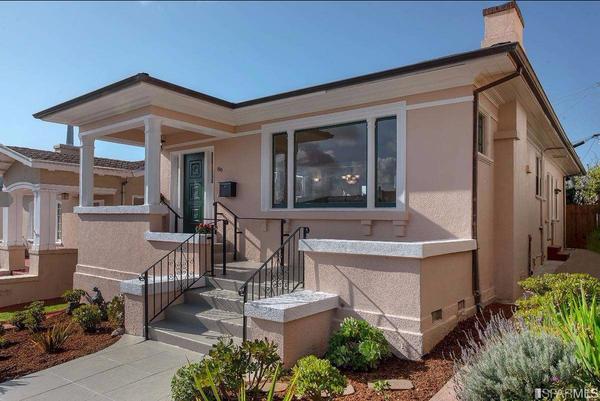
Top 5 Tips to Add Value to your Home
With home values on the rise, many homeowners are looking for ways to increase their property's value. Whether you're planning to sell your home soon, or you simply want to boost its resale value for the future, there are plenty of things you can do to increase your property's value. In this blog post, we'll discuss the top 5 things homeowners can do to increase the property value.1. Make Exterior ImprovementsThe first place to start is with the exterior of your home. Your home's curb appeal is the first impression that potential buyers will have, so it's essential to make it count. Consider making improvements such as repainting the front door, upgrading the garage door, landscaping the yard, and adding outdoor lighting. Even small changes can make a big difference in the overall appearance of your home.2. Upgrade the KitchenThe kitchen is often referred to as the heart of the home, and it's also one of the most important rooms when it comes to adding value. Upgrading your kitchen doesn't have to be a huge renovation project. Small changes such as updating the countertops, installing new appliances, or adding a fresh coat of paint can make a significant impact. If you have a larger budget, consider replacing the cabinets or adding an island.3. Add a BathroomIf you have the space and budget, adding a bathroom can be a significant value-adding investment. Buyers are often looking for homes with multiple bathrooms, so adding an extra one can make your property more appealing. If adding a bathroom isn't feasible, consider upgrading your existing bathroom with new fixtures, lighting, or a fresh coat of paint.4. Improve Energy EfficiencyEnergy-efficient features are becoming more and more important to homebuyers. By upgrading your home's energy efficiency, you can not only increase your property's value, but also save money on utility bills. Consider installing new windows, adding insulation, or upgrading your HVAC system. You can also make smaller changes such as adding a programmable thermostat or switching to energy-efficient light bulbs.5. Finish the BasementIf you have an unfinished basement, finishing it can be a great way to add value to your property. A finished basement can be used as additional living space, a home office, or even a guest suite. It's important to make sure that the basement is properly waterproofed and insulated before beginning any renovations.In conclusion, there are many ways to add value to your home. By making exterior improvements, upgrading the kitchen, adding a bathroom, improving energy efficiency, or finishing the basement, you can increase your property's value and make it more attractive to potential buyers. Remember, even small changes can make a big impact, so don't underestimate the power of a fresh coat of paint or new fixtures. With a little effort and investment, you can increase your home's value and enjoy the benefits for years to come.

Appraisal vs CMA
When it comes to selling a home, one of the most critical steps is determining its value. Knowing how much your property is worth can help you set a reasonable asking price, negotiate with potential buyers, and ensure a successful sale. But with so many terms and tools in the real estate industry, it can be confusing to understand what kind of valuation you need and why. In this blog, we will discuss the difference between an appraisal and a Comparative Market Analysis (CMA), and how they can help sellers determine the value of their homes.Appraisal vs CMA: What's the difference?An appraisal is a professional evaluation of a property's value conducted by a certified appraiser. The appraiser will consider various factors, including the property's location, size, age, condition, and features, as well as comparable sales in the area, to determine its market value. An appraisal is typically required by lenders when a buyer is obtaining a mortgage to purchase a home.On the other hand, a CMA is a report created by a real estate agent to estimate the value of a property. This report is based on recent sales of comparable properties in the area, as well as the current state of the market. A CMA is not as comprehensive as an appraisal, but it can still provide valuable insights into the value of a home.When to use an appraisal?As mentioned earlier, appraisals are typically required by lenders when a buyer is obtaining a mortgage. This is because the lender wants to ensure that the property is worth the amount of money they are lending. However, sellers can also choose to get an appraisal if they want an accurate and reliable valuation of their property. Appraisals can be expensive, ranging from a few hundred to several thousand dollars, depending on the size and complexity of the property, but they can be worth the investment if you want to set a realistic asking price.When to use a CMA?A CMA is less expensive and less comprehensive than an appraisal, but it can still provide valuable insights into the value of a property. Real estate agents can create a CMA for their clients, which is typically free of charge. CMAs can be useful when you are trying to determine the asking price for your home or when you want to understand how your property compares to others in the area. However, it's important to note that a CMA is not a formal appraisal, and it cannot be used for mortgage lending purposes.Choosing the right valuation method for your propertyDeciding whether to get an appraisal or a CMA depends on various factors, including your budget, your goals, and the complexity of your property. If you are selling a unique or high-end property, an appraisal may be necessary to ensure that you are setting a fair and reasonable asking price. However, if you are selling a more straightforward home in a relatively stable market, a CMA may be sufficient to provide you with the information you need to price your home competitively.ConclusionIn conclusion, both appraisals and CMAs are tools that can help sellers determine the value of their homes. While appraisals are more comprehensive and expensive, they are necessary for mortgage lending purposes and can provide a more accurate and reliable valuation. On the other hand, CMAs are free, less comprehensive, and best used for setting an asking price or understanding how your property compares to others in the area. Ultimately, the choice between an appraisal and a CMA will depend on your specific needs and circumstances. However, consulting with a reputable real estate agent can help you decide which option is best for you.

How is my Property Value Determined
As a seller, one of the biggest concerns is getting a fair price for your property. But how do you determine the value of your property? The answer is simple - through appraisal. An appraisal is a professional assessment of your property's value, which takes into account various factors. Let's delve into these factors to understand how your property's value is determined.LocationOne of the most important factors that determines the value of your property is its location. The value of a property can vary greatly depending on where it's located. For instance, properties located in prime locations, such as near shopping centers, schools, hospitals, and public transportation are likely to be more valuable than those that are located in remote areas. This is because properties located in prime locations are more in demand, and demand drives up the price.Size and ConditionThe size and condition of your property are also important factors that determine its value. Generally, larger properties are more valuable than smaller ones. However, the condition of the property also plays a crucial role in determining its value. A well-maintained property that's in good condition is likely to be worth more than one that's in poor condition. Buyers prefer properties that are move-in ready, so if your property needs repairs or renovations, it's essential to factor in the costs of these repairs when determining its value.Comparable SalesComparable sales, also known as comps, are properties that are similar to yours and have recently sold in your area. These sales give appraisers a good idea of what your property's value should be. Appraisers compare your property to these recently sold properties, taking into account factors such as location, size, and condition. If your property has features that are not present in the comparable sales, such as a swimming pool or a big garden, these features can increase your property's value.Market TrendsThe current state of the real estate market also affects the value of your property. If the real estate market is hot and properties are selling quickly, your property is likely to be worth more. On the other hand, if the market is slow and properties are taking longer to sell, your property's value may be lower. It's essential to keep track of market trends and adjust your property's price accordingly.Economic ConditionsEconomic conditions, such as interest rates, inflation, and unemployment rates, also affect property values. When interest rates are low, more people can afford to buy properties, and demand for properties increases. This, in turn, drives up property values. Conversely, when interest rates are high, it becomes more difficult for people to get mortgages, and demand for properties decreases, which can lower property values.In conclusion, the value of your property is determined by several factors, including its location, size and condition, comparable sales, market trends, and economic conditions. It's essential to keep these factors in mind when determining the value of your property to ensure that you get a fair price when selling your property. Working with a professional real estate agent can help you navigate these factors and ensure that your property is priced correctly.
Categories
Recent Posts










